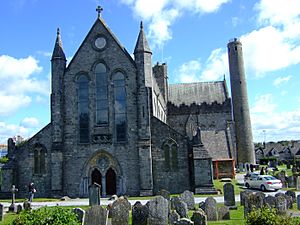William de Karlell facts for kids
William de Karlell (who died in 1383) was an important person in Ireland during the 1300s. He was born in England and worked as a judge, a government official (called an administrator), and a church leader (a cleric). He held several important church positions, including being the Archdeacon of Meath and the Rector of Youghal. He also took part in the Irish House of Commons, which was like a parliament.
For some years, William de Karlell was a Baron of the Court of Exchequer (Ireland). This was a special court that handled money matters for the King. He was removed from this job after many people complained about his actions and those of another judge, Chief Baron Holywood. However, he later regained the King's trust and briefly served as the main judge, the Chief Baron of the Irish Exchequer. He is buried in St Canice's Cathedral in Kilkenny.
Contents
Early Life and Family
William de Karlell got his family name from his hometown, Carlisle in England. Sometimes, people just called him Karlell. His brother, John de Karlell (who died in 1393), was also an important figure. John worked as the Chancellor of St Patrick's Cathedral, Dublin, and he also became a Baron of the Irish Exchequer, just like William. For a short time, John was even the main financial officer for the King in Ireland, known as the Chancellor of the Exchequer. In 1375, William became a canon (a type of priest) at Ferns Cathedral.
William de Karlell lived mostly in Kilkenny, a city in Ireland. He was a burgess, which meant he was an important citizen of the city. He also died there. In 1374, both William and his brother John were asked to attend the Parliament of Ireland in Dublin. They represented Kilkenny City in this parliament. Other members of the Karlell family also lived in Kilkenny.
Challenges and Return to Favor
Around 1376, there was a big political problem in Ireland. The King's representative, Sir William de Windsor, was very unpopular. William de Karlell and his fellow judge, Robert de Holywood, were seen as friends of Windsor. Because of this, both judges faced strong criticism. They were removed from their jobs and called to England to explain themselves to the English Privy Council. Many important Anglo-Irish nobles (Irish people of English descent) accused them of unfair actions.
However, no further action was taken against them. Holywood decided to retire, but William de Karlell's troubles did not last long. In 1383, the King appointed him as the Queen's lawyer for Ireland. Soon after, he was made the Chief Baron, the highest judge in the Exchequer court. Sadly, he died just a few months after getting this important promotion. After his death, his executor (the person who managed his estate), William Karlell the younger, had to deal with some debts William owed to the King. William the younger asked for a pardon for these debts, which was granted after he paid £40.
Important Duties
In the 1300s, the Catholic Church was often the only place where people could get a good education. Because of this, church officials like William de Karlell were often also government workers. William's jobs were much more than just being a judge. He checked government accounts, collected money owed to the King, and oversaw elections for local officials called sheriffs. He also looked into the condition of lands owned by the King and even searched for buried treasure.
These duties involved a lot of hard work and cost him money. For example, in 1374, he received £20 to cover expenses, including the theft of his horse while he was traveling from Carlow to Drogheda. He also lost two other horses while working on a long investigation about the King's rights in County Wexford and County Waterford, especially concerning hidden treasure. He asked for money to cover these losses. In 1380, he was sent to Counties Cork and Limerick to collect all money owed to the King from that time or from the previous King's rule.
It is possible that his work for the King made him unpopular with the powerful Anglo-Irish families. This might explain why he faced accusations of unfair behavior, especially around the mid-1370s, when he was linked to the disliked Windsor government.
Personality and Reputation
From what we know about William de Karlell, he seemed to be a proud man who cared a lot about his own importance. In 1372, Sir William de Wellesley, who was the High Sheriff of Kildare (a local official) and an ancestor of the famous Duke of Wellington, was arrested. This happened because he did not obey a request to appear before Karlell. The next year, a man named Richard Bateman was found guilty of showing disrespect to the court. He had said that Karlell was not important enough to arrest someone of Wellesley's high social standing.
The many complaints made against him in 1376 by Anglo-Irish nobles show that he was not very popular and could be bossy. However, it is not clear how true the accusations of unfair behavior really were. He also seemed to like going to court himself. In 1375, he sued Nicholas Calf and Henry Blake for trespass (entering his land without permission) and demanded that they be punished when they did not show up in court.
His Burial Place
James Graves, who wrote a history of St. Canice's Cathedral in 1857, described William de Karlell's tomb. It was a stone slab shaped like a coffin, about six feet long and two feet wide. It was raised about two feet from the floor of the cathedral. The tomb was very plain, with no decorations, except for an inscription that showed William's name and his church jobs. His brother John was also buried in St. Canice's ten years later, but much of his tomb was destroyed in the 1600s.


